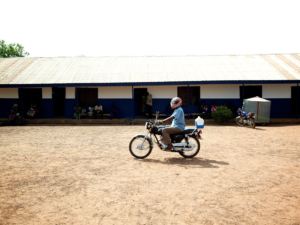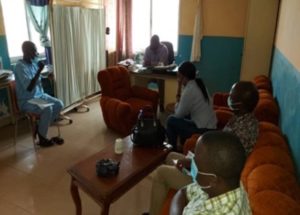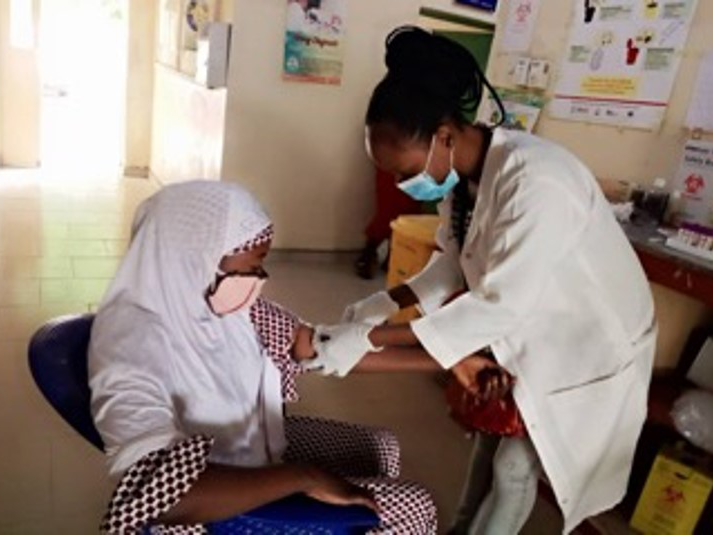As countries in sub-Saharan Africa race against the clock to ready public health systems before an expected surge of COVID-19 cases, ICAP in Nigeria is helping over 49,000 people living with HIV to maintain stable supply lines of HIV anti-retroviral therapy (ART) during the national lockdown instituted to stop the spread of the novel coronavirus.
This effort to maintain critical HIV services during the COVID-19 pandemic is part of ICAP’s support to the government of Nigeria through the Reaching Impact, Saturation, and Epidemic Control (RISE) project, which strengthens countries to achieve and maintain epidemic control by providing strategic technical assistance and direct service delivery to improve HIV prevention, case finding, treatment programming, and viral load suppression. Funded by the U.S. President’s Emergency Plan for AIDS Relief (PEPFAR) through the U.S. Agency for International Development (USAID), RISE is implemented by a consortium led by Jhpiego in partnership with ICAP, and the project is supporting the COVID-19 response in multiple countries during this global pandemic.
For people living with HIV, consistently taking daily medications is key to staying healthy. Left untreated, HIV attacks the body’s immune system and allows opportunistic infections, like the novel coronavirus, to overwhelm the body’s normal protections. As countries like Nigeria move to enact essential measures to slow the spread of COVID-19 in communities and health facilities across the country, people on treatment for HIV have been left stranded without easy access to the HIV medications they need to keep their immune systems strong and minimize both the duration and severity of respiratory symptoms should they contract COVID-19.
“As public lockdown measures were enacted to protect Nigeria from the spread of the virus, we found that while the general public is safer because of these emergency measures, the effect on our clients has been a dramatic reduction in the means of accessing critical HIV care and treatment services,” said Olawale Fadare, MBBS, technical director of ICAP in Nigeria and RISE-Nigeria. “Even if hospitals and HIV treatment centers remain open, our clients increasingly cannot reach them due to lack of funds stemming from unexpected job loss and strict travel restrictions between states and districts.”
 Seeing these challenges, Dr. Fadare and his team recognized that the best way to ensure patients have uninterrupted supplies of their HIV medications during stay-in-place orders was to create ART pickup locations outside of clinics and nearer to patients, including deliveries to homes, community pharmacies, and local vendors. People in each of these new distribution points received supplementary training on the disbursement of antiretrovirals and received ongoing support from the RISE project. Additionally, RISE rapidly mobilized local community health workers to identify patients who could benefit from expanded in-person and virtual HIV support services. Working in partnership with community care centers, almost 21,000 people were contacted and offered delivery of bulk quantities of HIV medications, often as much as a three-month supply. This expanded service ensures that all enrolled clients have enough medication for the duration of the national lockdown and can avoid queues for services at congested medical facilities.
Seeing these challenges, Dr. Fadare and his team recognized that the best way to ensure patients have uninterrupted supplies of their HIV medications during stay-in-place orders was to create ART pickup locations outside of clinics and nearer to patients, including deliveries to homes, community pharmacies, and local vendors. People in each of these new distribution points received supplementary training on the disbursement of antiretrovirals and received ongoing support from the RISE project. Additionally, RISE rapidly mobilized local community health workers to identify patients who could benefit from expanded in-person and virtual HIV support services. Working in partnership with community care centers, almost 21,000 people were contacted and offered delivery of bulk quantities of HIV medications, often as much as a three-month supply. This expanded service ensures that all enrolled clients have enough medication for the duration of the national lockdown and can avoid queues for services at congested medical facilities.
RISE also rapidly mobilized local community health workers to provide a variety of in-person and virtual HIV support for people on treatment in their own communities, including the creation of several WhatsApp chat groups to provide health information to clients with internet-enabled phones. Trained case managers coordinated these remote support services, which were particularly helpful in supporting expectant mothers with HIV, and used the WhatsApp groups to promote healthy habits and adherence to HIV medications in a time of acute stress. Prior to conducting all outreach activities related to the novel coronavirus, ICAP staff and program support volunteers received virtual training on COVID-19 disease biology and prevention methods to enable them to reassure clients while protecting themselves and promoting evidence-based infection control measures.
 “In these uncertain times, ICAP in Nigeria is contributing its unique expertise in systems-level HIV service delivery and programmatic implementation to ensure that people living with HIV in Nigeria have access to the medications that they need to stay healthy and well,” said Adewale Akinjeji, MD, MBA, country director of ICAP in Nigeria. “During pandemics, it is even more important to protect the health of those who are on HIV treatment. We cannot reverse the gains we have made in scaling up treatment for HIV in moments of crisis like the current COVID-19 pandemic”
“In these uncertain times, ICAP in Nigeria is contributing its unique expertise in systems-level HIV service delivery and programmatic implementation to ensure that people living with HIV in Nigeria have access to the medications that they need to stay healthy and well,” said Adewale Akinjeji, MD, MBA, country director of ICAP in Nigeria. “During pandemics, it is even more important to protect the health of those who are on HIV treatment. We cannot reverse the gains we have made in scaling up treatment for HIV in moments of crisis like the current COVID-19 pandemic”
Learn more about ICAP’s work in the COVID response.
Image captions — Header image: An ICAP laboratory technician collects a viral load sample at a health facility. Image 1: As countries like Nigeria enforce travel restrictions to contain the spread of COVID-19, ICAP is leveraging long standing community outreach networks to deliver HIV medications to patients, including delivery systems via motorbike (pictured), car, foot, and donkey. Image 2: An ICAP technical expert conducts a site support visit with health facility management and staff.
A global health leader since 2003, ICAP was founded at Columbia University with one overarching goal: to improve the health of families and communities. Together with its partners—ministries of health, large multilaterals, health care providers, and patients—ICAP strives for a world where health is available to all. To date, ICAP has addressed major public health challenges and the needs of local health systems through 6,000 sites across more than 30 countries.








